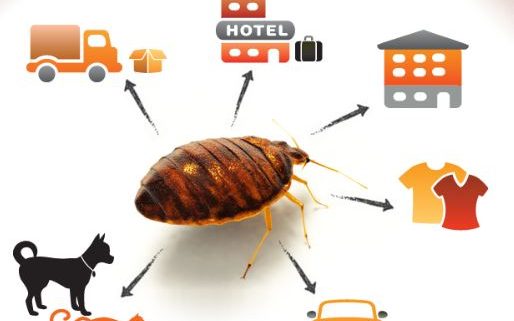Kinds Of Parasite Control: Which Approach Is Right for Your Problem?
When confronted with a parasite problem, the option of an ideal approach for parasite control is crucial in effectively managing the circumstance. From chemical treatments to biological solutions, there exists a series of techniques that can be employed to address various kinds of bugs. Each approach features its own set of benefits and considerations, making the decision-making process a nuanced one. Recognizing the nuances of each technique and reviewing their compatibility with the details parasite infestation handy is essential for achieving long-term success in bug administration. By discovering the various sorts of pest control techniques readily available, people can make enlightened choices customized to their distinct conditions, making certain an extra efficient and sustainable end result in pest eradication.
Chemical Bug Control
Chemical insect control entails using synthetic or normally obtained chemicals to take care of and remove pest populations efficiently. This method is typically utilized in agriculture, forestry, and residential setups to combat a large range of bugs, consisting of insects, weeds, and rodents. Making use of chemical pesticides can give fast and targeted remedies to pest problems, making it a preferred option for numerous individuals and companies.
Among the key benefits of chemical pest control is its capability to promptly remove insects, reducing the risk of damage to plants, building, and human health and wellness. By utilizing specific chemicals that target certain bugs, this method can properly control problems while lessening damage to valuable microorganisms and the atmosphere when used properly.
Nevertheless, using chemical pest control additionally raises issues concerning possible damaging effects on non-target species, water sources, and human wellness. It is important to adhere to safety guidelines, use chemicals sensibly, and take into consideration alternative parasite control approaches to decrease these threats and guarantee lasting bug administration practices.
Organic Parasite Control
Biological pest control, additionally understood as biocontrol, utilizes living microorganisms to manage and lower parasite populations normally. By using the pest's all-natural predators or pathogens, biological pest control provides a eco pleasant and lasting solution to pest management.

Mechanical Parasite Control
Using hand-operated and physical methods to manage bug populations, mechanical parasite control uses an alternate technique that does not count on the usage of living organisms or synthetic chemicals. This approach entails the usage of obstacles, traps, or other tools to literally hinder or eliminate parasites. By blocking pest entrance points or establishing up traps to capture them, mechanical bug control can effectively minimize problems without introducing chemicals into the setting.
One common instance of mechanical parasite control is using mesh screens on doors and windows to avoid bugs from entering structures. This simple yet effective approach acts as a physical obstacle, maintaining insects out while enabling for correct air flow. In addition, devices like mousetraps, fly swatters, and ultrasonic repellents drop under the mechanical pest control classification.
While mechanical pest control methods can be labor-intensive and call for regular tracking and upkeep, they offer a eco pleasant and sustainable remedy for managing parasite problems. By incorporating various mechanical strategies, homeowner can create an extensive pest control strategy that minimizes reliance on chemical pesticides.
Physical Parasite Control

Some typical physical insect control approaches include the use of obstacles such as internet or screens to prevent parasite entrance, catches to record and remove pests, and hand-picking to physically eliminate pests from plants or frameworks. Furthermore, methods like warm treatments can be utilized to manage bugs like bed pests by raising the temperature level to levels that are lethal to the insects.
Physical insect control is specifically beneficial in incorporated pest monitoring (IPM) methods, where numerous bug control methods are incorporated for effective bug management while minimizing making use of chemicals. By making use of physical pest control strategies, people can efficiently deal with pest problems with very little environmental influence.
Integrated Insect Management
When carrying out physical bug control approaches as part of bug monitoring approaches, Integrated Insect Monitoring (IPM) becomes a thorough approach that leverages different methods to efficiently control pest populations. IPM concentrates on long-term prevention of bugs through a combination of biological, social, physical, and chemical devices customized to details parasite issues. By integrating numerous control strategies, IPM aims to lessen the risks linked with insects while likewise reducing reliance on chemical remedies.
One key aspect of IPM is the focus on tracking and analyzing pest you can try these out populations to determine one of the most appropriate control techniques. This proactive approach permits early intervention and targeted strategies, bring about extra effective pest management. Furthermore, IPM promotes environmentally friendly methods by focusing on non-chemical control techniques and just using chemicals as a last option.
Conclusion

By using the insect's natural killers or virus, biological insect control offers a eco pleasant and sustainable option to pest management. - Kings cincinnati pest control companies
Utilizing hand-operated and physical approaches to take care of bug populations, mechanical parasite control offers a different approach that does not rely on the usage of living organisms or artificial chemicals.An efficient strategy to taking care of parasite populaces without relying on chemical or biological methods entails the usage of physical bug control methods.When applying physical pest control methods as part of pest management techniques, Integrated Parasite Administration (IPM) emerges as a comprehensive strategy that leverages numerous techniques to effectively control pest populaces. Chemical pest control includes the usage of pesticides, organic insect control uses all-natural killers, mechanical bug control includes physical barriers, physical insect control includes trapping or why not check here eliminating pests, and incorporated bug management integrates several methods for an alternative technique to pest control.